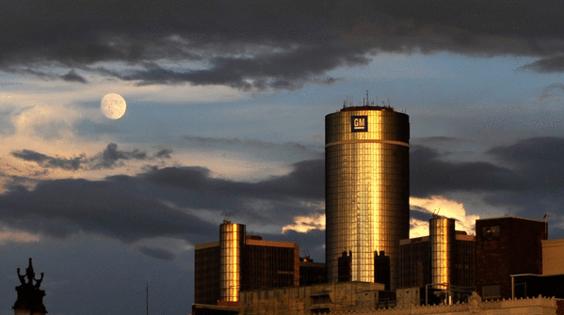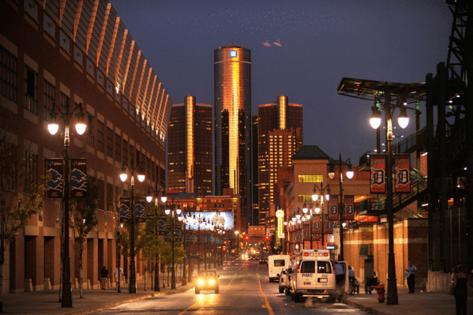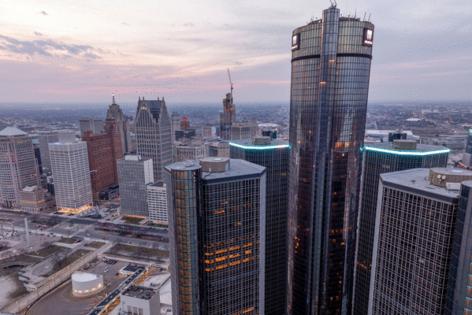Detroit's Renaissance Center would lose two towers, add apartments, riverfront park under new proposal
Published in Home and Consumer News
DETROIT — The Renaissance Center would shrink to three towers with residential, office and hotel tenancy to create space for a six-acre riverfront park in a more than $1.6 billion redevelopment plan dependent on $250 million in state support that would make billionaire mortgage mogul Dan Gilbert's real estate firm shared owner of the complex with current owner General Motors Co.
The proposal is a "right-sizing" of a half-century-old Detroit skyline icon for a new era of downtown living and work use, said Kofi Bonner, CEO of Bedrock Detroit LLC, Gilbert's real estate company.
To finance the massive redevelopment project, GM and Bedrock are seeking $250 million in taxpayer subsidies from the state of Michigan and financial support from Detroit's Downtown Development Authority. About $100 million would be the right kind of support requested from the DDA, Bonner said, naming tax-increment financing as a potential funding source.
Gilbert is contributing $1 billion in equity and debt, and GM is providing $250 million after having invested $1.5 billion into the building during its ownership. A new entity owning the site will reflect each party's contribution toward the redevelopment, said Dave Massaron, GM’s vice president of infrastructure and corporate citizenship.
Questions around the future of Michigan's tallest skyscraper arose in the wake of the COVID-19 pandemic that disrupted workplace models, sent many to do their jobs remotely and increasingly moved consumers to shopping online. The matter was exacerbated when GM in April said it was relocating its headquarters to the Bedrock-owned Hudson’s Detroit development next year. The automaker committed to working with Bedrock to find a solution for the Ren Cen within a year.
The five-tower, 5.5 million-square-foot structure would lose 1.25 million square feet from demolition of Towers 300 and 400 nearest the riverfront. The podium that consists of retail and showroom space on the ground floor around the towers would also be removed. The redevelopment, which would be contingent on approval of financial support from the state of Michigan, would happen in phases over years. Demolition could start within two years, Bonner said.
"It's really a question of finding the right combination of that mix of uses because we see that that is indeed the winning formula for the repositioning of assets," Bonner told The Detroit News. "But we also wanted to make sure that we could open up the Ren Cen to both the waterfront, we have this incredible asset that the city and the region has in the riverwalk, and we are building on this incredible asset in the downtown area and the Ren Cen and has effectively walled itself off over for decades. So a combination of opening up to the riverfront, opening up to downtown and reprogramming the building, the uses into a mix of residential, hotel, hopefully signature waterfront, event and dining experiences. That was our north star."
The central tower would remain along with Towers 100 and 200, the two facing Jefferson Avenue. Towers 300 and 400 would be demolished to make room for the park that would connect to the Detroit Riverwalk. The park would seek to be something akin to Chicago's Navy Pier or the area around the O2 Arena in London's South Greenwich neighborhood with entertainment, dining and sightseeing attractions.
The central tower, home to a Marriott International Inc. hotel, would continue to be a hotel but decrease to around 850 rooms from about 1,200 today. The top floors would be remodeled to create 200 high-end family apartments, Bonner said.
One of the remaining adjacent towers would convert to residential apartments with 300 to 400 units, the details of which are yet to be determined. The other tower also would be remodeled but still serve as office space, according to Bedrock.
"One of the towers, we believe we can modernize and retain as an office building in light of everything else we're doing in the immediate vicinity," Bonner said. "We feel that it'd be much more attractive, bring more amenities, perhaps inside and certainly in and around it, which is what we see the office market looking for."
The estimated $1.6 billion redevelopment cost includes the reimagined public walkway, public park, conference center, the new hotel, two office towers and the multi-family tower, Bonner said, adding the project would need "a few more dollars" for the entertainment piece.
The plan was met with some skepticism from one local real estate expert and a political leader who panned the idea of taxpayers helping foot the bill.
Jim Becker, managing director of the Detroit office of Avison Young, a global commercial real estate firm, said razing the two skyscrapers facing the riverfront eliminates some of the best views of the riverfront, Belle Isle, the Ambassador Bridge and Windsor, Ontario.
"I think the return on investment could be challenging — spending a billion dollars to create open space," Becker said. "... It’s hard to see how tearing down two-fifths of the infrastructure there is going to get a return. Optically, it’s just kind of strange to see the two towers on the city side."
House Republican Leader Matt Hall, a Richland Township Republican who will lead the House as speaker in January, was not amenable to the idea of taxpayer dollars going toward the rehabilitation of the RenCen, noting GM’s decision to move many jobs out of Detroit as well as recent layoffs at its Tech Center in Warren.
“How insulting is it to the taxpayers that these guys say, ‘We’re leaving Detroit and we want you guys to pay to tear down the building on the way out?’” Hall said. “That is insulting.”
Earlier this month, state Rep. Tyrone Carter, D-Detroit, expressed concerns about the effect a RenCen demolition would have on the Detroit skyline. He still has those concerns, but is interested in what GM is proposing for the location.
“I’d have to take a look at it and see where we are,” Carter said Monday. “That is as iconic to the city as the Spirit of Detroit and the Joe Louis Fist (statues).”
The $250 million state incentive being requested is a “substantial amount of money,” a sum that will require careful deliberation, Carter said.
“What is the benefit to it?” he asked. “I think there may be some pushback on that side of it.”
'The riverfront is our home'
Massaron said more than a decade ago, GM started to investigate how to create a headquarters that worked for its workforce and what to do with the Renaissance Center. Before the pandemic, GM and its contractors had as many as 4,000 employees housed in the RenCen. As of a year ago, GM's official headcount at the RenCen was about 1,300.
“We hired architects, we hired contractors, we hired consultants, and we looked at different possibilities,” Massaron said. “We explored many options on our own, including the sale of the asset. That received significant interest. But Detroit and Michigan are our home, and those potential sales of assets would not have preserved the icon that is the skyline of Detroit.”
Additionally, selling the asset wouldn’t ensure its future success, which GM wants, especially after spending more than $1.5 billion to make it more functional and with its commitment to the development of the riverfront.
“The riverfront is our home, and we think it needs to take the next step, and this building is a key part of that,” Massaron said.
Earlier this year, southeast Michigan and parts of central Michigan were ranked as the metropolitan area with the nation’s highest office vacancy rate at 25%.
GM is still working on the buildout of its space at the Hudson’s Detroit building. Massaron expects to be occupying it “at least” by January 2026, if not earlier. GM previously planned to occupy two floors but is now planning to double that.
“But that's an in-progress thing based on construction, availability of resources, and candidly, Bedrock has got an incredibly beautiful and complicated project they also have to finish,” Massaron told The News. “So, collectively, we'll be in that building very soon.”
As the Hudson's Detroit anchor tenant, GM, for 15 years, will lease floors in the 12-story mixed-use office, retail and event-space building adjacent to the 685.4-foot-tall tower that will have a hotel and residential housing. GM's logo is expected to appear on top of the Woodward Avenue building. There also will be a public showroom for GM on the ground floor.
Construction on the Renaissance Center began in 1973 under the vision of Henry Ford II in partnership with 26 other business leaders in an effort to encourage building activity in Detroit in the aftermath of the 1967 Detroit uprising. The $350 million project (roughly $1.7 billion today) was the country’s largest privately funded real estate development at the time. Upon opening in 1977, the center hotel tower was the largest in the world.
GM bought the riverfront skyscraper complex in 1996 for $73 million (about $142 million today) from crosstown rival Ford Motor Co., and Barra said the company has since invested more than $1 billion for its global headquarters. GM moved from Cadillac Place in the New Center district, though its home before that was on Woodward. In 2008 leading up to its bankruptcy, General Motors Corp. explored the possibility of a sale-leaseback for the RenCen, but it didn't have any takers.
For a while, GM has been looking to unload the more than 5.5 million-square-foot, seven-tower complex. Crain's Detroit Business previously reported Gilbert's Bedrock and GM had been in discussions in the fall of 2018 about a sale of the site; they fell apart because of costly renovations, including an overhaul of the heating, venting and air conditioning system.
Towers 500 and 600 were added in 1981, and a third phase that was supposed to include residential housing never came to fruition as Detroit's population continued to decline.
Farmington Hills-based Friedman Real Estate in December purchased the 500 and 600 towers in downtown Detroit from Public Service Enterprise Group Inc., a New Jersey energy company. Blue Cross Blue Shield of Michigan has a long-term lease for the 500 River East Tower.
©2024 www.detroitnews.com. Visit at detroitnews.com. Distributed by Tribune Content Agency, LLC.













Comments